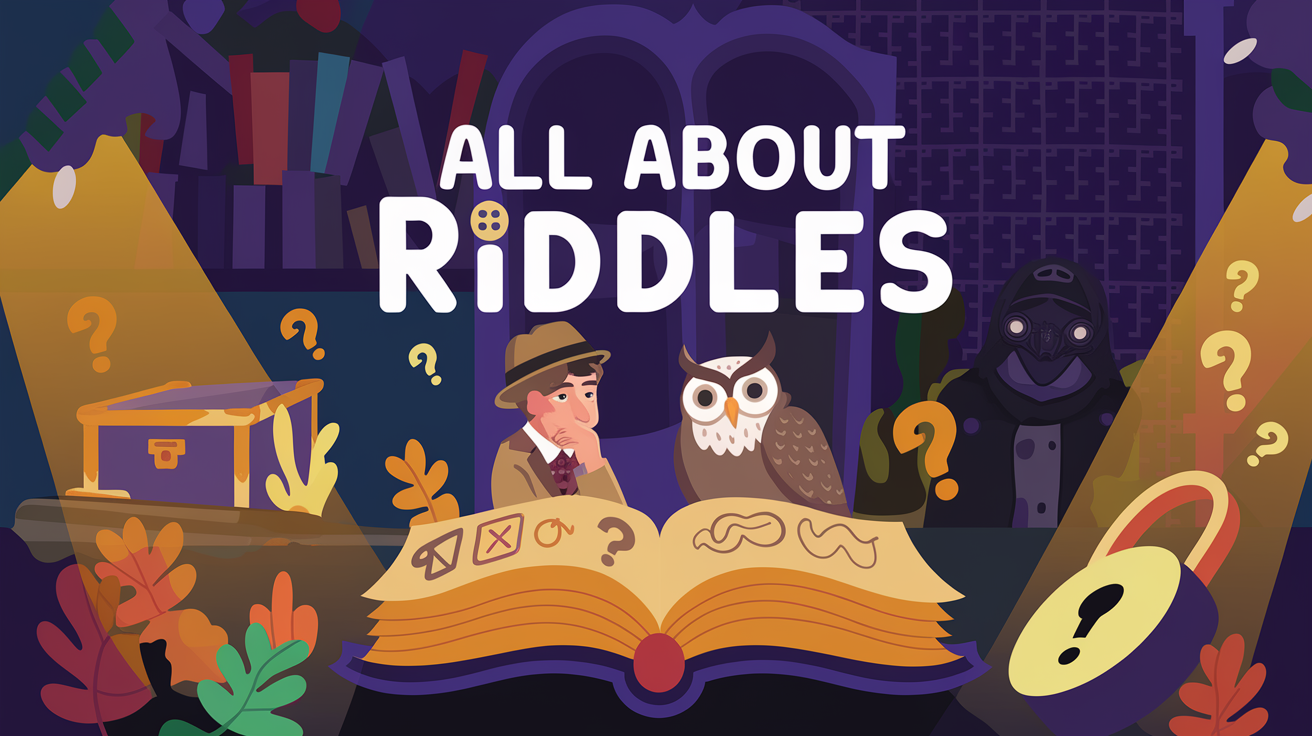Imagine this: I speak without a mouth and hear without ears. I have no body, but I come alive with the wind. What am I? If your mind is already racing for an answer, you’re not alone. Riddles have intrigued, entertained, and challenged us for centuries, making them one of the oldest forms of brain teasers known to humankind.
But why do we love riddles so much? Is it the thrill of solving a clever wordplay puzzle, the satisfaction of logical deduction, or the sheer fun of tricking our minds into thinking differently? The answer lies in how riddles stimulate our curiosity, creativity, and cognitive skills.
In this guide, we’ll dive deep into the history, types, benefits, and modern applications of riddles, along with an interactive section where you can put your skills to the test. Whether you’re a riddle enthusiast or just looking for a fun way to challenge your brain, this is your ultimate hub for all things riddles!
Let’s unravel the mystery together. Ready? Let’s begin! 🚀
Why We Love Riddles: A Timeless Brain Teaser
Imagine this: I speak without a mouth and hear without ears. I have no body, but I come alive with the wind. What am I? (Answer: An echo!)
Riddles have fascinated people for centuries, offering a mix of mystery, logic, and wordplay that challenges the mind. Whether you enjoy brain teasers, lateral thinking puzzles, or tricky enigmas, solving riddles is more than just fun—it’s a mental workout.
The Psychology Behind Riddle Solving

Why do we enjoy riddles so much? Neuroscientists suggest that solving puzzles triggers the brain’s dopamine release, creating a sense of reward and motivation. According to a study published in the Journal of Cognitive Neuroscience, problem-solving activities like riddles stimulate neural pathways linked to memory, reasoning, and creativity.
A Universal Love for Riddles
From ancient oral traditions to modern escape rooms, riddles have entertained and educated generations. Whether used as educational tools, party games, or stress-relievers, they continue to engage people across cultures and ages.
Can You Solve This?
“I speak without a mouth and hear without ears. What am I?”
If you’re already guessing, you’re experiencing the magic of riddles—a timeless form of brain exercise that teases the mind and challenges our way of thinking.
What Are Riddles?
A riddle is more than just a tricky question—it’s a puzzle wrapped in wordplay, logic, and lateral thinking. Some use clever phrasing to mislead, while others rely on abstract reasoning to unlock their secrets. From ancient folklore to modern-day games, riddles have stood the test of time, continuing to spark curiosity across generations.
Why Do We Love Riddles?
Ever wondered why solving a riddle feels so satisfying? It all comes down to:
- 🧠 Brain Stimulation – Riddles sharpen critical thinking, boost memory, and enhance problem-solving skills.
- 🎭 The Fun of Wordplay – Many riddles rely on puns, double meanings, and twists, making them both tricky and entertaining.
- 🤔 Curiosity & Challenge – The thrill of unraveling a difficult riddle keeps us engaged, eager for that satisfying “aha!” moment.
- 🎉 Social Connection – Riddles are great conversation starters, party games, and learning tools, making them fun to share.
Riddles: A Timeless Tradition
From Greek mythology’s Sphinx to modern-day escape rooms and puzzle games, riddles have evolved but never lost their appeal. Whether they make us laugh, stump us, or change the way we think, riddles remind us that the best answers aren’t always the most obvious.
Ready to challenge your mind? Let’s dive into the world of logic puzzles, word riddles, and brain teasers that have fascinated people for centuries! 🚀
The History & Cultural Significance of Riddles
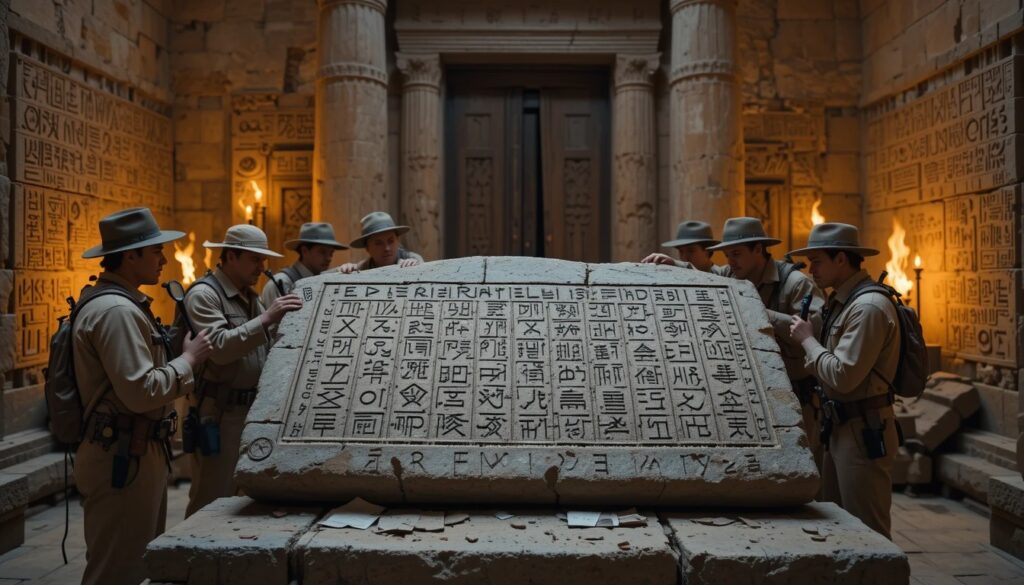
Riddles are as old as storytelling itself. Long before books and puzzles, oral traditions carried riddles across civilizations, challenging minds and passing down wisdom through generations.
One of the most famous ancient riddles comes from Greek mythology—the riddle of the Sphinx:
“What walks on four legs in the morning, two in the afternoon, and three in the evening?”
This legendary brain teaser, posed to travelers at the gates of Thebes, symbolized the stages of human life. Answering correctly meant survival, while failure meant doom—a testament to the power riddles held in ancient cultures.
The Egyptians and Norse mythology also embraced riddles. Hieroglyphic puzzles appeared in tomb inscriptions, while Norse sagas featured riddle duels, where wisdom and wit determined a warrior’s fate.
Riddles in Literature: A Game of Wits
Some of the greatest literary works have used riddles to test intelligence, drive the plot, or reveal hidden truths. One of the most famous examples is the riddle contest in The Hobbit between Bilbo Baggins and Gollum:
“This thing all things devours:
Birds, beasts, trees, flowers…”
This battle of wits wasn’t just a game—it was a matter of life and death, reinforcing how riddles often held symbolic meaning in folklore and literature.
Riddles in Cultures Around the World
Across continents, riddles evolved into unique cultural expressions:
- African oral traditions use riddles to teach children problem-solving and critical thinking.
- Japanese Zen kōans (a form of paradoxical riddles) encourage deep contemplation.
- Medieval Europe saw riddle collections in Latin texts, often testing religious or philosophical knowledge.
Despite their differences, all these riddles share one purpose: to challenge perception, provoke thought, and entertain. Whether in ancient myths, classic literature, or modern-day puzzles, riddles continue to shape the way we think and see the world.
From Ancient Puzzles to Modern Games
From mythology to escape rooms, poetry to social media trends, riddles remain a timeless way to test wit and creativity. While they may have started as survival tests or philosophical lessons, today, they serve as entertainment, education, and even a tool for cognitive development.
And just like centuries ago, a well-crafted riddle still has the power to stump, surprise, and satisfy. Ready to explore more? Let’s dive deeper into the different types of riddles and how they challenge our minds! 🚀
Ancient Riddles: From Sphinxes to Norse Legends
One of the oldest recorded riddles comes from Ancient Egypt, where the mythical Sphinx posed its famous challenge:
“What walks on four legs in the morning, two in the afternoon, and three in the evening?”
The answer? A human—crawling as a baby, walking as an adult, and using a cane in old age. This riddle, first documented in Greek mythology, reflects how riddles were used to test wisdom and intelligence in ancient times.
Meanwhile, Norse mythology features Odin’s riddle contest in the Poetic Edda, where wisdom could mean the difference between life and death. Riddles were a sign of wit, strategy, and survival.
Types of Riddles and Their Unique Characteristics
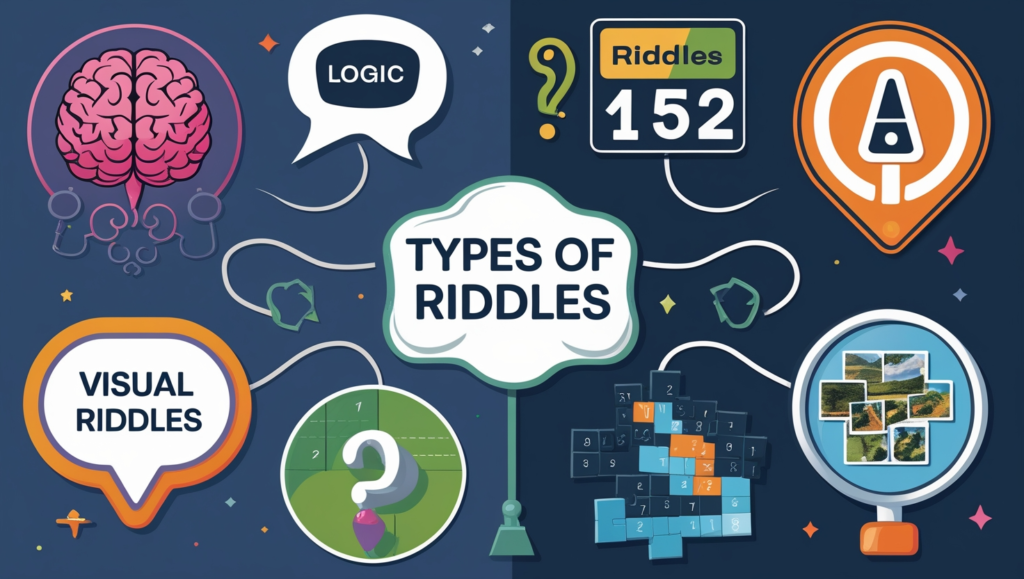
Not all riddles are created equal! Some test logic, others rely on wordplay, and some require mathematical precision. Understanding different riddle types can help you master their tricks and challenge your brain in new ways.
Logic Riddles – The Art of Deductive Thinking
Logic riddles test your problem-solving skills by presenting situations that require careful reasoning. They often follow a structured pattern, where every clue leads to a logical conclusion.
🔹 Example: A man leaves home, makes three left turns, and returns home to find two masked men waiting for him. Who are they?
💡 Answer: The catcher and umpire in a baseball game!
These riddles sharpen critical thinking, reasoning, and cognitive skills, making them favorites in IQ tests and puzzle competitions.
Wordplay Riddles – The Fun of Double Meanings
Wordplay riddles rely on puns, homophones, and linguistic twists to mislead and amuse. The challenge lies in recognizing the hidden play on words.
🔹 Example: What has a heart but no other organs?
💡 Answer: A deck of cards!
By tricking the mind with ambiguity and unexpected connections, these riddles entertain while enhancing verbal intelligence.
Math & Number Riddles – Where Logic Meets Numbers
Math riddles require arithmetic, sequences, and pattern recognition to solve. They can be deceptively simple or mind-bogglingly complex.
🔹 Example: I am a three-digit number. My tens digit is five more than my ones digit, and my hundreds digit is eight less than my tens digit. What number am I?
💡 Answer: 194!
These riddles develop numerical reasoning, mental math skills, and pattern recognition, making them a great exercise for the brain.
Lateral Thinking Riddles – Thinking Beyond the Obvious
Lateral thinking riddles force you to step outside conventional logic and approach problems from unexpected angles. They often seem impossible until you shift perspective.
🔹 Example: A man pushes his car to a hotel and immediately knows he’s bankrupt. How?
💡 Answer: He’s playing Monopoly!
These puzzles encourage creative problem-solving, abstract thinking, and a fresh perspective on challenges.
Visual & Picture Riddles – The Power of Observation
Not all riddles rely on words—some use optical illusions, hidden objects, or patterns to test your visual perception.
🔹 Example: Spot-the-difference puzzles, hidden images in paintings, or pattern recognition tests.
These riddles enhance attention to detail, observational skills, and spatial awareness, making them popular in IQ tests and escape rooms.
Why Understanding Riddle Types Matters
By recognizing the different types of riddles, you can train your brain to think logically, decode language tricks, solve numerical puzzles, and embrace creative thinking. Whether you’re solving them for fun, brain training, or friendly challenges, riddles provide endless entertainment and mental stimulation!
Why Solving Riddles is Good for Your Brain
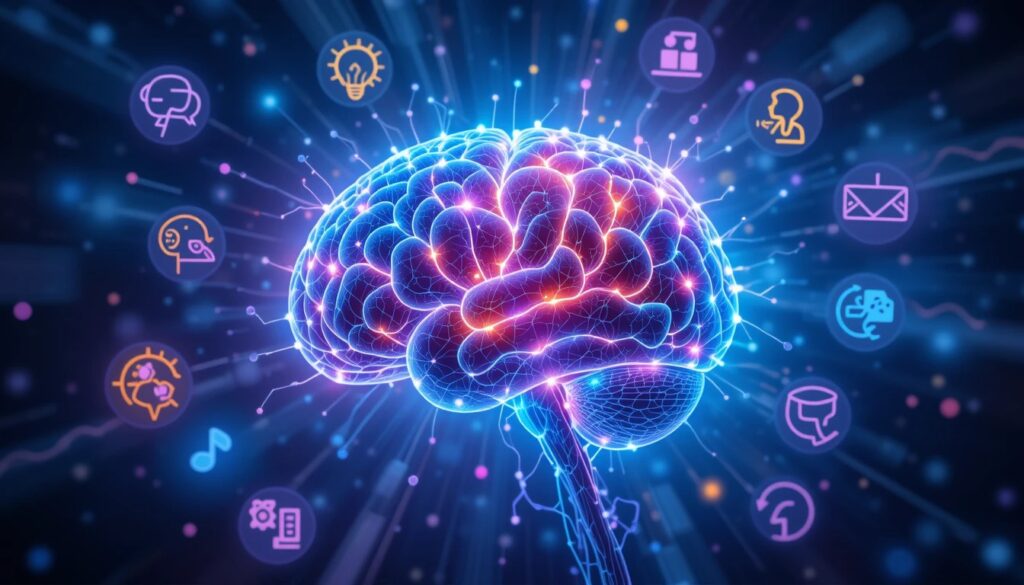
Riddles are more than just fun brain teasers—they act as mental workouts, sharpening your mind and boosting cognitive abilities. Whether you’re solving a tricky logic puzzle or unraveling a clever wordplay riddle, your brain benefits in multiple ways. Let’s explore how riddles enhance thinking, memory, and creativity.
The Psychological Impact: How Riddles Stimulate Creative Thinking
Beyond cognitive benefits, riddles also improve lateral thinking, creativity, and mental flexibility. They force us to think beyond the obvious, making connections we might not otherwise consider. This is why riddles are used in education, corporate training, and even intelligence testing.
🧩 Example: A classic lateral thinking riddle:
“A man looks at a painting in a museum and says, ‘Brothers and sisters, I have none, but that man’s father is my father’s son.’ Who is in the painting?”
(Answer: His son!)
Cognitive Benefits: Sharpening the Mind
Solving riddles exercises critical thinking, problem-solving, and pattern recognition. When you engage with a puzzle, your brain activates multiple areas responsible for reasoning, memory, and linguistic skills.
🔹 Boosts Problem-Solving Skills: Riddles force you to analyze information, think systematically, and arrive at a solution.
🔹 Improves Memory: Deciphering tricky wordplay or logic-based riddles strengthens recall and retention.
🔹 Enhances Creativity: Many riddles require lateral thinking—looking beyond the obvious to find unexpected answers.
💡 Example Riddle: The more you take, the more you leave behind. What am I?
✅ Answer: Footsteps!
This type of question challenges the brain to think abstractly, improving mental agility over time.
Psychological Impact: Stimulating Lateral Thinking
Riddles encourage lateral thinking, a problem-solving approach that requires shifting perspectives and finding non-traditional solutions. Studies show that engaging with riddles can:
✔️ Increase dopamine levels, creating a sense of accomplishment when solving a puzzle.
✔️ Reduce stress by redirecting focus from worries to a challenging yet enjoyable task.
✔️ Strengthen mental flexibility, improving adaptability in real-life decision-making.
How Educators Use Riddles for Learning and Engagement
Teachers and educators frequently use riddles as a learning tool to engage students and develop logical reasoning.
🧠 In Language Learning: Riddles enhance vocabulary, comprehension, and word association skills.
🧮 In Math Education: Math riddles and number puzzles make learning arithmetic fun and interactive.
🎭 In Critical Thinking Exercises: Riddles encourage students to think beyond textbook answers, fostering creative problem-solving.
💡 Example Classroom Riddle: I have keys but open no locks. What am I?
✅ Answer: A piano!
By incorporating riddles into learning, educators make lessons engaging, thought-provoking, and memorable.
Final Thoughts: Training Your Brain for a Sharper Mind
From enhancing memory to boosting creativity and critical thinking, riddles offer a simple yet powerful way to keep your brain active. Whether used for personal enrichment, stress relief, or education, riddles are an enjoyable and effective tool for mental fitness.
Test Your Skills: Fun & Challenging Riddles to Solve
Now that we’ve explored the fascinating world of riddles, it’s time to put your skills to the test! Below, you’ll find a mix of easy, tricky, and mind-bending riddles, carefully curated to challenge your logical thinking, wordplay skills, and lateral thinking.
Scroll through the themed sections and see how many you can crack—no peeking at the answers too soon!
🔹 Warm-Up Riddles (Easy & Fun)
Let’s start with some simple ones to get your brain warmed up.
1️⃣ What has to be broken before you can use it?
🔽 Reveal Answer: An egg!
2️⃣ The more you take, the more you leave behind. What am I?
🔽 Reveal Answer: Footsteps!
Brain Teasers (Tricky & Clever)
These riddles require a bit more thinking. Ready?
3️⃣ I speak without a mouth and hear without ears. I have no body, but I come alive with the wind. What am I?
🔽 Reveal Answer: An echo!
4️⃣ What comes once in a minute, twice in a moment, but never in a thousand years?
🔽 Reveal Answer: The letter “M”.
Themed Riddles: Science, Pop Culture & More
Want a riddle tailored to your interests? Try these!
🧪 Science Riddle:
5️⃣ I have cities but no houses, forests but no trees, and rivers but no water. What am I?
🔽 Reveal Answer: A map!
🎬 Pop Culture Riddle:
6️⃣ I’m the wizard who lived under the stairs before discovering his destiny. Who am I?
🔽 Reveal Answer: Harry Potter!
❄️ Seasonal Riddle:
7️⃣ You see me once in June, twice in November, but never in May. What am I?
🔽 Reveal Answer: The letter “E”.
How to Create Your Own Riddles
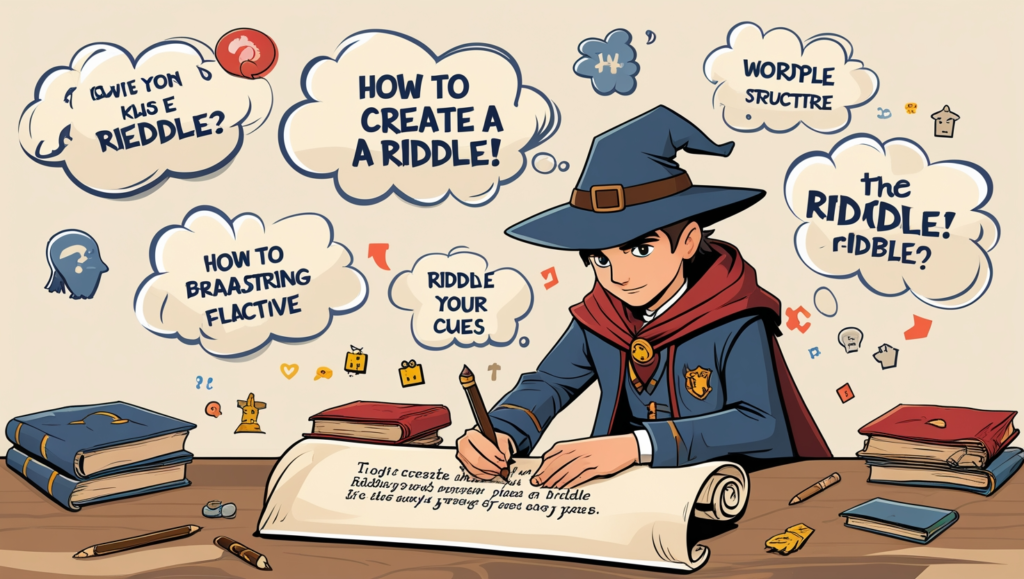
Ever wondered how riddles are made? Behind every clever puzzle lies a structured setup, misdirection, and a satisfying punchline. Whether you want to craft a riddle for fun, challenge your friends, or sharpen your wordplay skills, here’s how you can create your own unique and engaging riddles.
🔹 Understanding Riddle Structure
A great riddle follows a simple yet effective formula:
- The Setup – Introduces the mystery or challenge.
- The Misdirection – Uses wordplay, logic twists, or hidden meanings to confuse the solver.
- The Punchline – The “aha!” moment that delivers a clever, often surprising answer.
🔹 Example:
👉 Setup: The more you take, the more you leave behind.
👉 Misdirection: It sounds like a paradox, making you think of objects, not actions.
👉 Punchline: Footsteps!
Step-by-Step Guide to Crafting a Riddle
Want to create a riddle that stumps and delights? Follow these simple steps:
1️⃣ Pick a Concept or Object
Start with a common word, idea, or object that has multiple meanings or an unexpected trait. Examples: light, time, echo, or shadow.
2️⃣ Use Wordplay or Hidden Meanings
Think about synonyms, homonyms, or metaphors related to your chosen concept. How can you describe it in a way that misleads yet remains true?
3️⃣ Create a Thought-Provoking Setup
Frame your riddle as a question, short statement, or rhyming phrase.
✔ Example: I have hands but cannot clap. (Answer: A clock)
4️⃣ Add a Touch of Misdirection
Make the solver think in the wrong direction by using familiar words in an unfamiliar way.
✔ Example: I’m tall when I’m young and short when I’m old. (Answer: A candle)
5️⃣ Test and Refine
Share your riddle with friends or family. If they solve it too easily, tweak the wording to make it trickier. If it’s too hard, adjust the clues to make the answer more accessible.
Fun Applications of Riddles
Riddles aren’t just brain teasers for personal enjoyment—they have found their way into various aspects of modern entertainment, social interactions, and even technology. From escape rooms to AI, let’s explore how riddles shape the world around us.
Riddles in Escape Rooms & Puzzle Games
If you’ve ever stepped into an escape room, you’ve likely encountered riddle-based challenges designed to test your problem-solving skills.
🔐 Why riddles work in escape rooms:
✔ They encourage teamwork and critical thinking.
✔ They create suspense and add to the immersive experience.
✔ They require lateral thinking to crack codes, find keys, or unlock doors.
🎮 Riddles in Video Games:
Popular games like The Legend of Zelda, The Witness, and Professor Layton use riddles as a core gameplay mechanic, forcing players to think outside the box to progress.
Social Engagement: Icebreakers & Party Games
Riddles are a fun and interactive way to break the ice at gatherings, making conversations more engaging.
🎉 Where riddles shine socially:
✔ Party games – Games like Riddle Me This or 20 Questions spark laughter and challenge wits.
✔ Storytelling – Mystery novels and detective tales often use riddles to build suspense (Think: Sherlock Holmes!).
✔ Classroom learning – Teachers use riddles to make learning more interactive and improve student engagement.
Riddles in AI, Cryptography & Coding Challenges
Beyond fun and games, riddles play a role in modern technology and cybersecurity.
🤖 AI & Riddles:
✔ AI models like ChatGPT are trained to solve complex riddles, helping them improve natural language processing and contextual understanding.
✔ Some AI systems use riddles to test logic and reasoning abilities in machine learning.
🔐 Riddles in Cryptography & Security:
✔ Some ancient riddles have evolved into modern-day encryption techniques, where puzzles must be solved to decrypt messages.
✔ Cybersecurity experts use puzzle-based challenges in hacking competitions to test their skills.
💻 Coding Riddles & Problem-Solving:
✔ Platforms like LeetCode, HackerRank, and CodeSignal use riddle-like coding challenges to assess logical thinking.
✔ Google, Meta, and other tech giants include riddle-based interview questions to evaluate problem-solving skills.
The Lasting Benefits of Riddles
✔ Boosts brainpower – Enhances problem-solving skills, memory, and critical thinking.
✔ Encourages creativity – Trains your brain to think in unconventional ways.
✔ Strengthens social bonds – Riddles make great conversation starters, icebreakers, and party games.
✔ Enhances learning – Used in classrooms, coding challenges, and AI development to improve logical reasoning.
Dive Deeper Into Riddles
Explore our curated riddle collections categorized by type, difficulty, and theme. Click on any category to test your wits!
- Fox Riddles
- What Has a Neck But No Head Riddles
- Confusing Riddles
- Bible Riddles
- Birthday Riddles
- Sphinx Riddles
- Kids Riddles
Keep Your Mind Sharp: Embrace the Power of Riddles
From ancient riddles whispered through myths to modern brain teasers woven into games and escape rooms, riddles have stood the test of time. They entertain, challenge, and strengthen our critical thinking, problem-solving, and creativity in ways few other puzzles can.
Whether you’re drawn to the wit of wordplay riddles, the logic of math puzzles, or the lateral twists of tricky brainteasers, one thing is certain—riddles keep your mind sharp, agile, and always curious.
Now it’s your turn! Share your favorite riddle in the comments, challenge a friend, or explore more in our handpicked riddle collections. Want to take it a step further? Test yourself with our interactive riddle quiz and see how many you can solve!
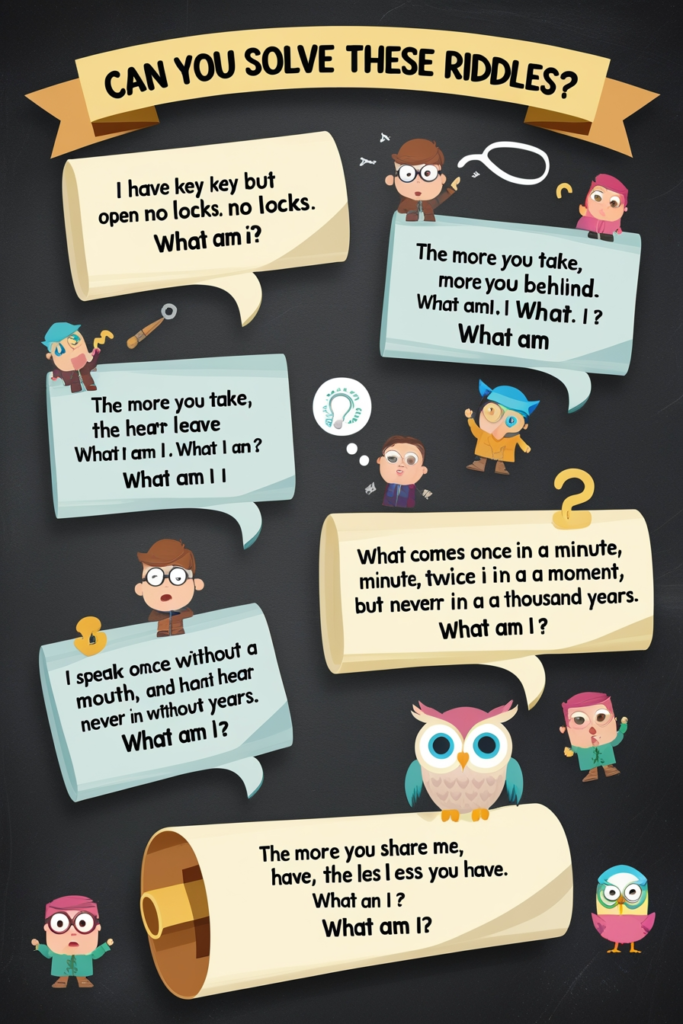
The world of riddles is endless—so keep thinking, keep solving, and most importantly, keep having fun! 🎭💡
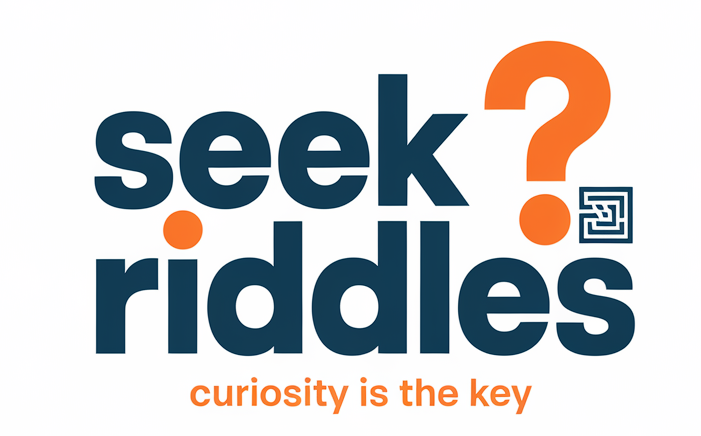
Seek Riddles is a creative brand dedicated to crafting fun, thought-provoking riddles and brain teasers. We aim to inspire curiosity, challenge minds, and bring joy to puzzle enthusiasts of all ages. Join us on a journey of discovery and mental adventure!
